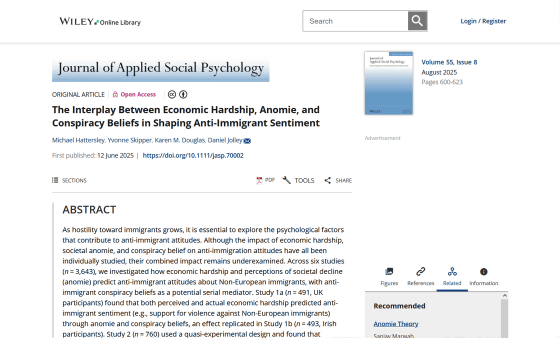Study finds that 'weak economic conditions' fuel anti-immigrant conspiracy theories

Previous research has shown that people who are more likely to believe in conspiracy theories
The Interplay Between Economic Hardship, Anomie, and Conspiracy Beliefs in Shaping Anti‐Immigrant Sentiment - Hattersley - 2025 - Journal of Applied Social Psychology - Wiley Online Library
https://onlinelibrary.wiley.com/doi/10.1111/jasp.70002

Worsening economic conditions fuel anti-immigrant conspiracy beliefs and support for violence
https://www.psypost.org/worsening-economic-conditions-fuel-anti-immigrant-conspiracy-beliefs-and-support-for-violence/
Previous research has shown that conspiracy theories tend to thrive in times of increased uncertainty about the future and social division, and that economic stress can also fuel resentment and distrust toward certain groups. However, no research has examined whether these factors also fuel anti-immigrant conspiracy theories.
A research team led by Daniel Joly, an associate professor of social psychology at the University of Nottingham in the UK, investigated whether economic hardship increases a sense of anomie , which refers to the breakdown of social norms, and whether this in turn increases the receptivity to conspiracy theories that believe immigrants are the cause of social problems.
'In both Ireland and the UK, attacks on non-European immigrants have been on the rise. We wanted to go beyond superficial attitudes and understand the deeper psychological drivers of this hostility,' Jolie told PsyPost. 'We investigated how economic hardship and a sense of social disintegration (anomie) fuel conspiracy theories about immigrants, and how these beliefs escalate into violent intent.'

The researchers surveyed 984 adults in the UK and Ireland, asking them about their perceptions of economic and social decline, belief in anti-immigrant conspiracy theories, and support for policies and actions regarding non-European immigrants, including restricting refugees' access to welfare and justifying violent acts.
The results showed that both perceived and actual economic hardship were associated with higher levels of anomie. Furthermore, anomie was strongly associated with belief in conspiracy theories that immigrants are secretly trying to undermine the nation's values and economy. People who believed these conspiracies were more likely to support discriminatory policies, condone violence, and express intentions to engage in violence themselves.
Indeed, a study of 760 participants living in economically disadvantaged and affluent areas of the UK found that those living in poorer areas reported higher levels of anomie, stronger beliefs in anti-immigration conspiracy theories, and less support for immigration policy.
The researchers then asked participants to imagine themselves as belonging to a fictional society where they were either high-income or low-income, and then answered questions about anomie and conspiracy theories related to immigration. The results showed that participants who imagined themselves as belonging to a low-income society were more likely to experience anomie, believe in conspiracy theories about immigration, and support violence and protests against immigrants.
In the final experiment, participants were asked to imagine themselves in a fictional society where they belonged to either a high- or low-income group. Some participants were also shown a fabricated news article suggesting that non-European immigrants were secretly trying to destabilize the economy. Compared to a control group, participants who read the conspiracy theory article showed stronger conspiracy beliefs, more negative attitudes toward immigrants, and increased willingness to commit violent acts. This was particularly evident in participants assigned to the low-income group.

'Through these studies, we find clear evidence that economic hardship can weaken social cohesion and fuel conspiracy beliefs about non-European immigrants. These beliefs are linked to anti-immigrant attitudes and even violent intent,' Joly told PsyPost. 'Importantly, these results suggest that we need to address not only xenophobia directly, but also its underlying causes, such as poverty and feelings that society is falling apart.'
This means that preventing the spread of anti-immigrant conspiracy theories requires not only addressing xenophobia itself, but also focusing on economic poverty and maintaining social order. 'In our policy paper, we argued that economic hardship not only causes material poverty, but also undermines social cohesion and political literacy. Our policy recommendations call for addressing these underlying social and economic inequalities as part of any strategy to reduce xenophobic violence,' Jolie said.
Related Posts:
in Science, Posted by log1h_ik







